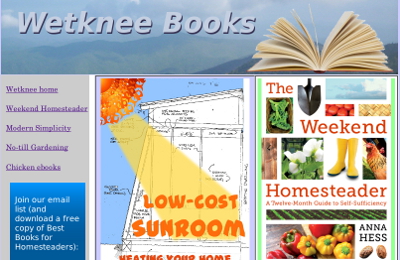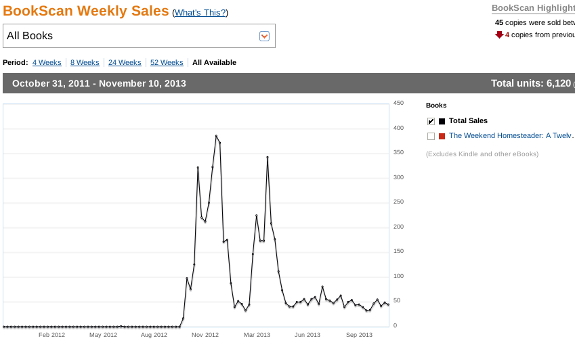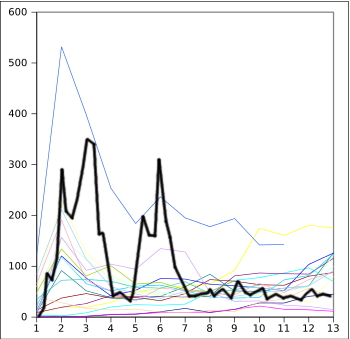
Ebooks vs. paper books
 "I'm curious about your book experience. After doing many ebooks and one big book what
is would be your preference for future books? Are you finding that
sales are still doing well for all your books or are there standout
ones?"
"I'm curious about your book experience. After doing many ebooks and one big book what
is would be your preference for future books? Are you finding that
sales are still doing well for all your books or are there standout
ones?"
I know this question
isn't really homesteading-related, but several of our readers have
self-published ebooks and/or have been holding out to sign on with a
publisher, so I thought the topic would be helpful for more than just
Mikey to hear about. I also highly recommend ebooks to
homesteaders as a potential income source, so even if you haven't
written one yet, you might want to take note.
Of course, this post is also partly because I just wanted a chance to crunch data. After all, I let a publisher take The Weekend Homesteader and run with it as an experiment to test this precise question. And no experiment is worth much without a conclusion.
First, a caveat: I don't actually know how exactly many paper books I've
sold and how much I've made from the operation. I won't get my
first statement and royalty check until next month (yes, that is 19
months after turning in my manuscript). I'm also a bit fuzzy on
how much I'll make per book --- I think it's about 65 cents, but that
depends on how each book was sold. (For comparison's sake, I make
35 cents every time one of my 99 cent self-published ebooks is sold and
75 cents every time one of my $1.99 ebooks is sold.)

What I do have is Bookscan data about The Weekend Homesteader
from Amazon's Author Central website. (They warn that the data is
usually underreported by about 25%, so I'm correcting it slightly in
the calculations below.) In the chart above, you can see that I
sold a lot of books for a couple of months, sold only a few when my
first printing ran out and we had to wait on the second set of books to
arrive, and then, after another couple of months of high sales, settled
in to selling about 50 books a week.
 Selling
a lot of books during the launch then a slow-but-steady stream later
seems to be the case with my ebooks as well. The chart to the left
shows estimated income from my paperback (in bold) versus all of my
ebooks over their first 13 months in the public eye. As you can
see, my best-selling ebook --- Trailersteading
--- actually made significantly more than my paperback did during that
period (and I didn't have to wait a year and half for the money).
My other ebooks didn't make quite as much as my paperback, but on the
other hand you have to keep in mind that the paperback is equivalent to
12 ebooks, so I figure I made a lot more per word even with my
moderately-selling ebooks. (As a side note: data for ebooks that
have come out in 2013 hasn't been added to this chart --- $10 Root Cellar looks like it might give Trailersteading a run for its money.)
Selling
a lot of books during the launch then a slow-but-steady stream later
seems to be the case with my ebooks as well. The chart to the left
shows estimated income from my paperback (in bold) versus all of my
ebooks over their first 13 months in the public eye. As you can
see, my best-selling ebook --- Trailersteading
--- actually made significantly more than my paperback did during that
period (and I didn't have to wait a year and half for the money).
My other ebooks didn't make quite as much as my paperback, but on the
other hand you have to keep in mind that the paperback is equivalent to
12 ebooks, so I figure I made a lot more per word even with my
moderately-selling ebooks. (As a side note: data for ebooks that
have come out in 2013 hasn't been added to this chart --- $10 Root Cellar looks like it might give Trailersteading a run for its money.)
 But
did the paperback boost my "brand" enough that it was worth taking the
per-word hit? The chart to the right looks at ebook sales two
years before, one year before, and then during the time my paperback has
been out. Although it looks like the paperback might have
increased ebook sales during the launch period (which is also when Trailersteading came out), if anything, it decreased sales later in the year. That's because once my publisher's version of The Weekend Homesteader became available in ebook form, my individual-month ebooks were no longer eligible for Amazon's KDP Select program,
which is a real money-maker. Plus, I'll only get about 65 cents
if someone buys the publisher's ebook or paperback, while I'd make $4.20
if that person instead bought all 12 months straight from me.
But
did the paperback boost my "brand" enough that it was worth taking the
per-word hit? The chart to the right looks at ebook sales two
years before, one year before, and then during the time my paperback has
been out. Although it looks like the paperback might have
increased ebook sales during the launch period (which is also when Trailersteading came out), if anything, it decreased sales later in the year. That's because once my publisher's version of The Weekend Homesteader became available in ebook form, my individual-month ebooks were no longer eligible for Amazon's KDP Select program,
which is a real money-maker. Plus, I'll only get about 65 cents
if someone buys the publisher's ebook or paperback, while I'd make $4.20
if that person instead bought all 12 months straight from me.
So, to answer Mikey's
question, I don't plan to publish any more print books with a publisher
anytime soon --- in this digital age, it doesn't feel like I really need
a middle man. (And wouldn't you rather spend $1.99 for an ebook
than $13.50 for a paperback?) Perhaps if I was the kind of person
who liked to go on tour, having a paper book would boost the brand
enough to make the it worthwhile, but since I'm a confirmed hermit,
ebooks seem to work better for me.
Which is not to say I regret publishing The Weekend Homesteader
on paper --- if nothing else, it probably reached a lot of eyes my
words wouldn't otherwise have appeared to. And I always like
experiments! But for those of you who are on the fence about
uploading your words straight to Amazon, I say go for it --- you
probably won't regret it.
Want more in-depth information? Browse through our books.
Or explore more posts by date or by subject.
About us: Anna Hess and Mark Hamilton spent over a decade living self-sufficiently in the mountains of Virginia before moving north to start over from scratch in the foothills of Ohio. They've experimented with permaculture, no-till gardening, trailersteading, home-based microbusinesses and much more, writing about their adventures in both blogs and books.
Want to be notified when new comments are posted on this page? Click on the RSS button after you add a comment to subscribe to the comment feed, or simply check the box beside "email replies to me" while writing your comment.

Personally I'm on the fence w.r.t. e-books.
Of course you cannot beat the production cost of an e-book. That is the biggest plus for authors, I think. And the most popular e-book format (epub) is basically just a bunch of webpages in a zipfile. So you can put in links to other sections et cetera. Those are definite advantages for some kinds of book, especially reference books.
That is the biggest plus for authors, I think. And the most popular e-book format (epub) is basically just a bunch of webpages in a zipfile. So you can put in links to other sections et cetera. Those are definite advantages for some kinds of book, especially reference books.
But I want to be able to read away from my computer...
Last year I had the opportunity to use an ipad for a couple of days. It's nice but I found it too dense (in the sense that its weight is relatively high for its size) to hold for an extended period.
Even an e-reader is just not the same as a real book. Where e-readers shine is the capability to take lots of books in a small package. So they are nice when travelling. But the layout and typography of a real book can be much better.
A definite plus for e-books that I should mention is the availability of many public domain titles from Project Gutenberg.
Given the availability of print-on-demand hardware (like the Expresso Book Machine), you might want to consider making your books available through that route for those that want a printed copy without you having to run big risks.
"in this digital age, it doesn't feel like I really need a middle man"
I'd agree with that. But it has to be said, you still have one .. its name is Amazon.
Roland --- I know what you mean --- as a reader, I like reading fiction on ereaders (vastly better than a computer, by the way), but prefer paper for non-fiction. I probably will eventually do some print-on-demand for my ebooks so they can be available on paper for readers like me, although it does drive the price way up.
Joey --- You're totally right. I guess I should have said, "I only need one middle man." I think traditional publishing is so bad for the author because there are so many middle men --- the publisher, the printing house, and then the website or store that sells the physical books. While some people would argue that each provides a valuable service and should be kept in business, I prefer being able to sell my ebooks for $1.99 nearly straight to the public.
Some middle-men do add value, I think.
There is value in catching mistakes. Generally for the technical work that I do I tend to have another person check it. Especially if the complexity goes up. This is because I noticed that after I've been working on something for a considerable amount of time I will just not notice some errors anymore.
In your reviews I've seen you remark that some self-published books could have benefitted from proper copy editing, both for brevity and style.
So in the authoring process copy-editing is a worthwile addition, IMO.
So I have to ask: do you sell a PDF version of the e-book directly from your site? I can't speak to the homesteading vertical, but organic/health/traditional foods vertical is booming with PDF e-book sales priced much higher than $1.99.
Our approach has been to sell PDF versions only for the first 6 months to a year and then convert to Kindle and iBooks to gain a wider audience at a lower price point.
As a professional freelance copy editor, I agree with Roland. Copy editing is a necessity. As with other necessities (e.g., personal hygiene), not all people who need it feel that it is necessary. Because of my editing skillz, my perspective is similar to what it feels like to be a person who owns a truck and has a lot of truck-less friends. Favor requests abound. That said.... Anna, if you ever want another set of eyes to look over a book... OR, if you know other homesteaders with e-books, who want another set of eyes to look over their books....
Saying this as a person who knows nothing about computer programming or website creation, it seems like it wouldn't be too difficult to put together a site that functioned as a much lower overhead middle man. I'm offended but not surprised that you make so little per paper book, but I feel like you should make even more with an e-book. Do you think that you benefit from people "window shopping" on Amazon, or do you think that a lot of the purchases come from people who know the blog? If your customers are from the blog, put up a store here and let us give you a full 1.99! Wetknee Independent E-book Store and Publishing Extravaganza!!
Regardless, I was pleasantly surprised when I was wasting some time in a bookstore while stranded with a dead car in Omaha this summer. I went to the gardening/self-sufficiency/homesteading section and saw "Weekend Homesteader" on the shelf! I made sure to set it on the shelf so it was facing outward instead of being stacked anonymously with the other books.
Roland --- You're totally right about copy-editing being very useful. However, as Stephen mentions below, it's pretty easy to contract that sort of business out. And from my own experience (from and what I've read on the internet), basic copy-editing is all you get even from a publisher nowadays --- the time of an editor helping you turn a manuscript into a masterpiece appears to be over.
Daniel (and partly Stephen) --- I'm interested to hear about your experience because mine was very different. As I explain in this post, I actually make more money from lower-priced ebooks because they get snapped up. In fact, I barely made any money on my ebooks when they were offered only on my website either at a low or high price --- the Amazon marketplace middle-man definitely seems to be worth giving them a large cut.
Stephen --- As I mentioned above, using Amazon does seem to be worth it due to the much higher number of books sold. And if I increase my price to $2.99 or above, I'd get 70% instead of 35% (but minus a delivery charge that gets pretty hefty if a book is image-heavy) --- I've just been afraid to add that extra dollar onto the price tag. Maybe one of these days I will....
I've been looking for a good copy-editor to clean up my ebooks. Want to email me your rates? (anna@kitenet.net)
Thanks for moving my book to the front!
Building a website is one thing. Building an interactive website that is secure is something else. Building a website that is secure for payment processing (I'm assuming you want to get paid ) is a whole other level.
You'll have to meet the requirements that banks and credit card companies
expect. If online payments were simple, people like paypal and amazon
wouldn't have a business. Doing it yourself is beyond the capabilities of
small businesses. So most use an external payment processor. The payment
process is quite involved, and security is paramount. First because you
could loose your customer's trust, and second because you are responsible and
liable for security breeches.
) is a whole other level.
You'll have to meet the requirements that banks and credit card companies
expect. If online payments were simple, people like paypal and amazon
wouldn't have a business. Doing it yourself is beyond the capabilities of
small businesses. So most use an external payment processor. The payment
process is quite involved, and security is paramount. First because you
could loose your customer's trust, and second because you are responsible and
liable for security breeches.